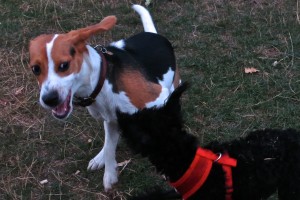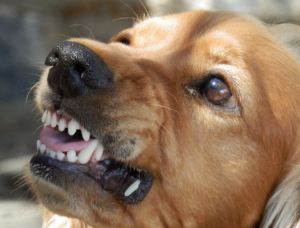Why Is My Dog Growling?
It can be disconcerting when you witness a dog growling – particularly if it is your own dog. Dogs growl for a number of reasons, but – while it can be worrying for dog owners – growling can actually be a good sign. To find out more about this important subject, read our interesting Holidays4Dogs article on the subject.
Growling is a natural means of communication for dogs. Despite this, many owners find the behaviour unsettling and concerning. Even though it can be worrying, it is very important the dog is not reprimanded for growling. However, it is important to understand the reason for the behaviour, before trying to address the problem.
it is very important the dog is not reprimanded for growling. However, it is important to understand the reason for the behaviour, before trying to address the problem.
Growling is one of the initial signals dogs display to show they are not happy with a particular situation – but it does not necessarily indicate the dog is aggressive.
In fact, growling shows that the dog would rather not fight and is attempting to avoid direct conflict.
If a dog’s growls are ignored – they may resort to snapping, or biting.
Factors associated with growling behaviour.
There could be many different reasons why a dog may resort to growling. This can be linked to the dog’s age, sex, temperament, as well as previous socialisation and training.
The circumstances in which the dog is growling can be numerous and are dependent on many different factors. Also bear in mind, there are different types of growling – some growls may mean “Hey, leave me alone” – others may indicate the dog is enjoying play.
Here are some initial things to think about when your dog growls;-
Is your dog?…
-
Anxious, or nervous?
-
Ill, or in pain
-
Happy playing with other dogs, or people?
-
Possessive over resources?
Now consider the details in which your was growling. If your dog is anxious was, he or she, startled by the approach of stranger, or the sound of loud noise outside the house, for example?  In this case, he is very likely to feel fearful and snarl as a result. Growling is common in nervous/anxious dogs and is an indication that he, or she, is feeling fearful, or stressed.
In this case, he is very likely to feel fearful and snarl as a result. Growling is common in nervous/anxious dogs and is an indication that he, or she, is feeling fearful, or stressed.
Other dogs might be possessive over resources and use growls to signal to other dogs, or people, to keep away from what they see as theirs. This might include claiming/guarding toys, food or, even people.
Dogs experiencing pain, or discomfort, are also much more likely to be vocal and can sometimes bite. Therefore, injured dogs should be handled carefully.
Dogs also frequently make snarling noises when they are playing with their owners, or commonly with other dogs. Puppies often growl while engaging in play, or play fighting, with their litter mates.
What to do if your dog growls.
A dog who growls, is warning those around him that he feels threatened and he may bite to protect himself. Therefore, it is important to address the underlying cause. If you have any reason to suspect your dog may be in pain, it is essential to seek veterinary attention straight away.
If a dog is frequently scolded for growling, he may learn to stop this behaviour. This might seem like a satisfactory solution, but this is far from the case.
Instead, he or she, may just go straight to nipping, or biting. In short, telling the dog off for giving a warning, can force him or her, escalate to the next step of actually biting. Never, hit or shout at your dog for growling. This is not to say you should ever ignore this behaviour. This is the dog’s way of communicating, so it is important to understand what the dog’s message is.
For fearful dogs, you may need to enlist the help of a good dog trainer, or behaviourist, to help your dog overcome his, or her, fears. Positive, dog-centred techniques – along with managing the dog’s environment – will drastically reduce your dog’s reasons to react.
If your dog growls at you when you try to take an item away from him, you must not battle with him, or scold him. Instead, try ‘trading’ the toy for another one.
Instead, try ‘trading’ the toy for another one.
This sort of approach works well with clicker training and should not be considered ‘bribery‘. You can teach your dog to retrieve a toy and, willingly, give it up for a reward.
Conclusion.
While occasional growling is usually nothing to worry about, frequent snarling, snapping and biting is a more serious situation.
Growling is a natural behaviour for canines and one of the ways in which they communicate with one another – and with us. However, dog owners should not ignore growling behaviour – particularly if this is directed towards people.
If you need help with your dog’s behaviour, do speak to your vet initially who will be able to rule out health conditions and refer you to a behaviourist if required.


